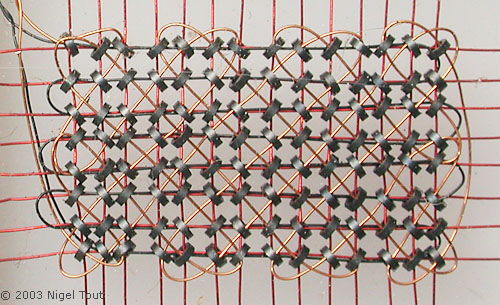
Posted on 09/30/2005 10:49:01 AM PDT by sourcery
The combined efforts of researchers from Durham University, Imperial College, London and the University of Sheffield have fructified. Till now the basic computer is usually made by using semiconductor electronics. The researchers have gone ahead and have successfully created a computer by using magnetic microchips rather than semiconductor electronics.
This development evidently offers a potentially economical and simpler way of computing for the future, which could also be put to new and useful purposes.
This research follows the team’s groundbreaking first step in 2002 at Durham, when they managed to create a basic computer operation or ‘logic gate’ using a magnetic microchip. Since 2002 the team has created a number of further ‘logic gates’ and created interconnecting structures using magnetic ‘nanowires ‘, which can now reproduce the logic functions of a conventional computer empowered by semiconductor electronics.
Dr Del Atkinson of Durham University comments on this success are: “This new technology offers a number of advantages over conventional computers. Electronic microchips generate a lot of heat, which creates the need for fans in PC units, whereas these magnetic microchips do not generate this heat. . The magnetic microchips that have been created are also simpler and potentially cheaper to produce than the electronic chips. They are economical insofar as they use simple metals layers.
This would also imply that the computers being economical would become still more disposable. “ This means that they could be used for cheap and therefore disposable simple computers in the future., “ Dr. Atkinson further commented: “These developments are important and exciting and while there is still some way to go, the potential is there to create a whole new technology based on magnetism rather than electricity.”
This use of magnetism, rather than that of electricity has potential of being exploited further .The team is working in the rapidly growing field of nanotechnology, harnessing the magnetic properties of electrons, rather than their electrical charge on which conventional electronics is based. Nanotechnology involves working with materials at an extremely microscopic level. A nanometre is one thousand millionth of a metre - about the width of five atoms.This harnessing the capability of magnetic properties of electrons could mean a sea-change in the field of electronics.
Ping
Ping!
ping
|
Fructified? Fructified... What an odd turn of the phrase!
That didn't take long. ;') The magnetic bubble research in the 60s and 70s led inexorably to almost nowhere (highly specialized memory products for extreme environments) until, indirectly and recently, hard drive capacity started to move up with a vengeance.
Could you modify the posting page software to automatically translate these into something FR can deal with?
team’s -> team's
‘logic gate’ -> 'logic gate'
‘nanowires ‘ -> 'nanowires'
Dr. Atkinson further commented: “These developments ... electricity.” -> Dr. Atkinson further commented: "These developments ... electricity."
There may be others as well.
This would certainly simplify the posting process.
Thanks!
FWIW, the very first computers were made with mechanical electromagnetic switches. The transistor is just a mini switch that works through applied voltage. It looks like things are just going back to the beginning - except smaller.
Fructified. If someone asked me what that meant, I would say, "to turn into fruit". I guess they mean "bore fruit". It is odd.

Never by a disposable computer. If it is disposable then the reliability is low.
Disclaimer: Opinions posted on Free Republic are those of the individual posters and do not necessarily represent the opinion of Free Republic or its management. All materials posted herein are protected by copyright law and the exemption for fair use of copyrighted works.